65 Habits That Can Help You Live A Longer Life

Any doctor will tell you that it’s much easier to prevent something than it is to reverse it. As we get older, our bodies may change and our athletic prowess may decline, but when it comes to how to live a longer, healthier life, the steps remain the same—for the most part. A healthy diet and regular activity are at the top of the to-do list, but it doesn’t stop there.
According to a 2018 study, adopting just five simple habits can help you boost your life expectancy by an impressive 12 to 14 years. Wondering how to live longer? Researchers found that never smoking, maintaining a healthy weight, engaging in regular physical activity, eating a healthy diet, and limiting alcohol consumption are the keys to living a longer, healthier life. Below, we’ve compiled health and wellness experts’ top tips to taking on these healthy habits—plus some more easy ways you can live a healthier lifestyle and live a longer life. (Start by trying out any of these 21 Best Healthy Cooking Hacks of All Time!)
Try Intermittent Fasting

“Create a 12- to 16-hour fast period in every 24-hour day by concentrating your food consumption to roughly eight to 12 hours and [not eating] outside of that window. This tells your nutrient-sensing pathways to trigger autophagy (the process in which your body culls dead/senescent cells) for optimal health, immunity, and vitality,” says Jillian Michaels, health and wellness expert and author of The 6 Keys: Unlock Your Genetic Potential for Ageless Strength, Health, and Beauty.
Take breaks at work

“Take several breaks at work: Go to the restroom and open the faucet with cold water, keep your hands underwater for a few seconds, and splash some of that water on your face. You will feel refreshed and energized,” says Milana Perepyolkina, an international best-selling author.
Move every day

“Exercise contributes to longevity, but not just living longer—living a vital life longer. Exercise decreases the risk of all major health complications, including heart disease, diabetes, and cognitive decline. Try adding in 15-30 minutes 2-3 times a week to begin, and build from there,” says Sarah Thacker, LPC, health coach, and yoga instructor.
Spend more time with loved ones

“When you feel connected to others and spend time having fun, sharing, and laughing, you naturally feel better and improve the quality of your life,” says Thacker.
Be consistent

A good routine is key when it comes to diet, and committing to a healthy eating plan is where you will reap the most benefits. “When I think of nutrition, I think about how it can not only be preventative but how it can manage disease,” says Jessica Crandall, a Denver-based RD, Certified Diabetes Educator, and National Spokesperson for the Academy of Nutrition and Dietetics. “I always say that it’s not one day that’s going to make you healthy or one day that’s going to make you unhealthy. It’s about adding that accountability in every single day that will help you improve your overall nutrition so that you can improve your health and longevity.”
Fuel up with protein

You don’t have to eat chicken for breakfast, lunch, and dinner, but it is recommended that you fit a hearty dose of protein at every meal. “Focusing on protein is something that’s really important as we get older because it plays a crucial role in keeping our muscles strong. You should be having a good protein source at breakfast, lunch, and dinner—whether that be beans, nuts, yogurt, eggs, meat, or fish. Aim for 20-30 grams per meal,” says Crandall.
Eat an antioxidant-rich diet
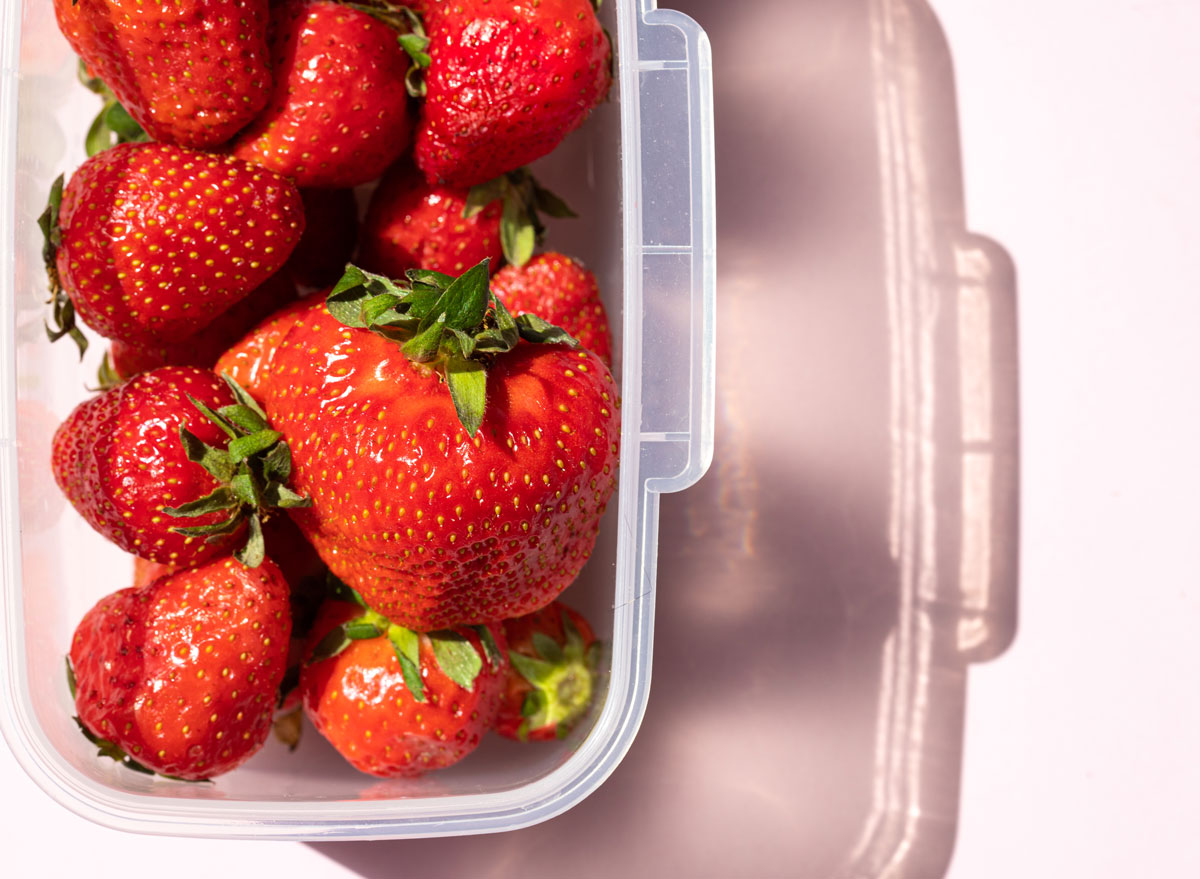
Antioxidants are one of your greatest defenses against aging, so it would serve you well to bolster your diet with as many as possible. “I’m always an advocate for adding antioxidant-rich foods to your diet to help prevent and ward off disease. Berries, bell peppers, grapes, and brightly colored fruits and veggies are all great options. I suggest having at least three cups of veggies and two cups of fruit per day at minimum,” says Crandall.
Drink more water

It’s impossible to talk about a healthy diet and aging without mentioning this essential component. Drinking enough water daily can help with weight management, skin health, and keeping your body efficient. “A good range is between 64 and 90 ounces of water per day, which would translate to eight glasses of eight ounces of water or more. Other fluids count toward hydration, including things like milk, decaf coffee, and teas,” says Crandall.
“Oftentimes, we confuse thirst with hunger. Staying hydrated helps regulate metabolism and keeps our minds alert. If you feel yourself running low on energy during the day, drink a glass of water and make sure that you’re not hungry. Drink water, unsweetened coffee and tea, and sparkling water; sugary drinks are an unnecessary source of calories, and diet soda can trigger cravings,” says Arianne Perry, Certified Health Coach, CEO & Founder of Sweet Defeat.
Cut out fake foods
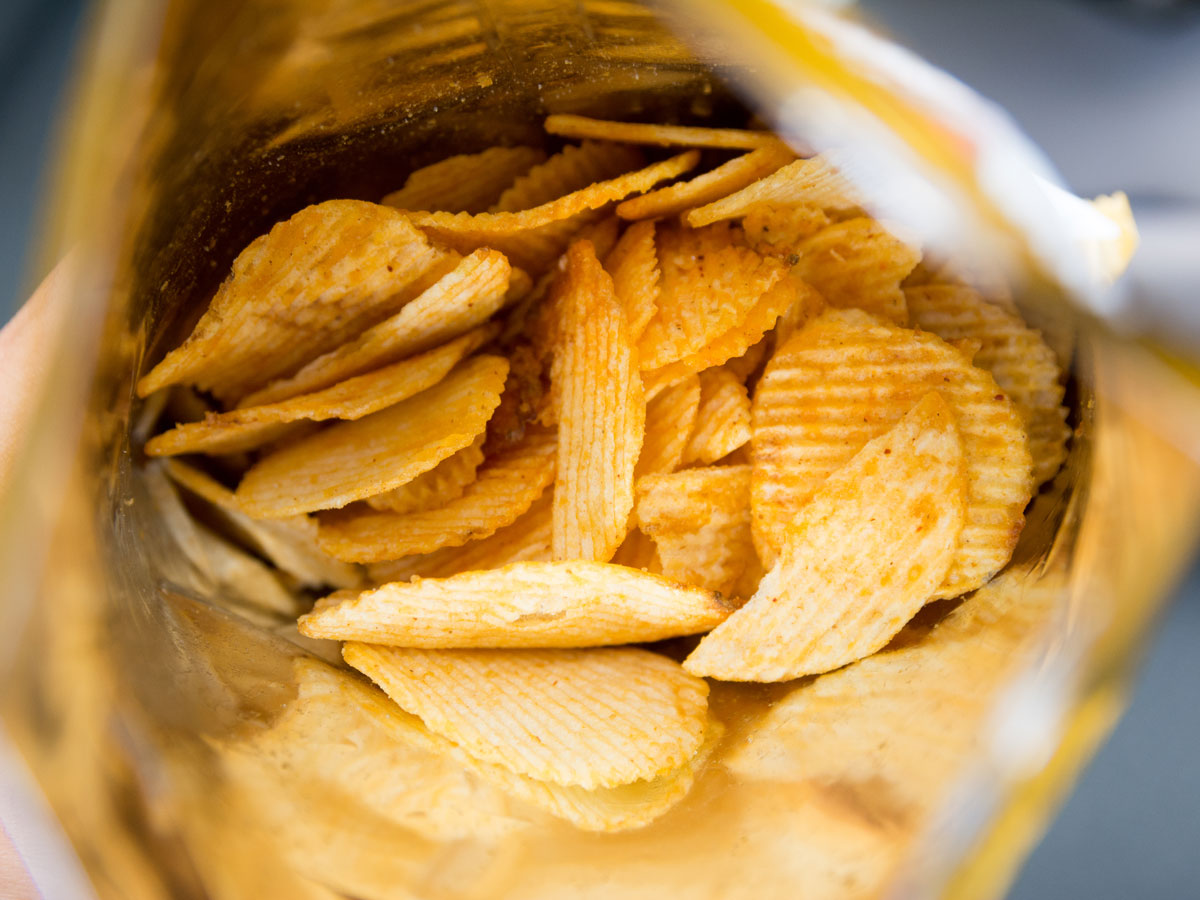
If the ingredient list is long and full of words you can’t pronounce, toss it. The best foods for your body don’t come in boxes. “As we get older, I think it’s important to cut out non-nutritive foods like added sugars and really limiting sweets. As we age, our palates can sometimes shift toward sweeter foods, so be mindful of that. The more sweets we have, the more inflammation we have. Inflammation in the body can put you at greater risk for cardiovascular disease, joint pain, diabetes, and metabolic syndrome,” says Crandall.
Don’t forget your omegas

By decreasing the amount of non-nutritive foods you consume and increasing the nutrient-dense ones, you’ll set yourself up for success in the long run. “Focus on omega-3-rich foods like tuna, salmon, mackerel, and herring. You should be eating fatty fish two or three times per week in three- to four-ounce servings. This helps to decrease inflammation. If you don’t eat seafood, you can take a fish oil supplement as an alternative. Aim for around 1,200 to 2,400 milligrams of omega-3s each day,” Crandall says.
Consult a dietitian

“The best thing we can have on our side is prevention. Working with a preventative specialist such as a dietitian can be really instrumental in making sure you’re hitting those good quality nutrition markers. I’d recommend seeing an RD once a year at a minimum; some people do it three or four times per year if they have an actual concern that needs to be addressed,” says Crandall. Leading a healthy life is all about developing good habits and exercising them daily. Consulting an expert helps take the guesswork out of it all and can help set you up for true success from the get-go.
Stock up on colorful produce

“Fill up on five to nine servings of colorful produce daily. Research shows that diets rich in fruits and vegetables help stave off disease and work wonders toward maintaining a healthy weight. Fruits and veggies may help protect against certain cancers, reduce the risk of heart disease, improve blood sugar levels, and allow us to fill up on fewer calories. To meet your daily produce quota, enjoy at least one serving of fruit or vegetables with each meal, and make your snacks fruit- or vegetable-based,” says Julie Upton, MS, RD, registered dietitian and co-founder of Appetite for Health.
Fit in “me” time every day

Stress is a major issue as we age. The older we get, the more responsibility we take on and the less time we have to ourselves. “Learning to de-stress is very important,” says Rachel Goldman Ph.D., psychologist, and clinical assistant professor, NYU School of Medicine. “If you’re typically at a high-stress level to begin with, it can make managing stressful situations much more difficult and as a result can take a greater toll on your health. If you can fit in some ‘me’ time into your day on a daily basis, your overall stress level or baseline is lower. Making sure you have good coping mechanisms to deal with stressors is important to our overall wellbeing as we age.”
Use your breath

Developing good relaxation techniques can be instrumental in handling difficult situations and keeping your mental state in a healthy place. “The easiest relaxation technique to do either in the moment or on a daily basis is to practice deep breathing techniques like diaphragmatic breathing. I usually have my clients practice doing that when they’re not stressed to learn how to do it properly. Try taking five deep breaths before you sleep or when you wake up. That way when a stressor comes, you have the technique readily available to you,” says Goldman.
Build a daily routine and stick to it

When we fall out of our daily routines, we tend to hit a few bumps in the road. Whether you confront dietary, physical, or mental challenges, having a routine can help minimize the effort in keeping yourself sane and healthy. “I always tell people, no matter what’s going on in your life, it’s critical to stick to a routine. Go to sleep and wake up at the same time every day, get dressed, and get out of the house. Give yourself a plan or schedule,” says Goldman.
Leave the house at least once per day

If you live somewhere with four seasons, we know it’s cold and dreary for at least a quarter of the year. But when it comes to your health, there are no excuses. “In the winter months, people start isolating themselves, and it has a ripple effect. You don’t want a 24-hour period to go by without leaving the house unless you’re sick or have a good reason. Even if it’s a walk around the block or going to your local coffee shop, doing something to get fresh air is so important. Our thoughts, behaviors, and emotions are all linked. By changing one of these things, the rest will follow. In general, this really helps people try to combat depression or seasonal affective disorder,” says Goldman.
Fitting activity into your day can seem unachievable, but it doesn’t take much to activate the health benefits of movement. “People don’t believe that a moderately-paced walk for 30 minutes per day can lower your risk for heart disease, [but it can]. Instead, they think you have to do more intense exercise,” says Dr. Nieca Goldberg, MD, and Clinical Associate Professor, Department of Medicine at NYU.
Know when to ask for professional help

“I think people don’t realize the benefit of being in therapy until they start,” Goldman says. “Usually, there’s a major life problem or stressor that gets them in the door. Once they’re there, they realize the benefit of it. The time at which I tell people to seek therapy is when people notice that their symptoms are impacting their daily functioning, or if the issues feel troublesome to the person. If things seem to be going well overall and you have a good supportive network, then you probably don’t need to seek professional help.”
Educate yourself on mental health

“Our newsfeeds are typically flooded with nutrition findings and workout tips, but in order to have a more accurate grasp on healthy practices, you need to stay in the know about all areas of health. By educating yourself about mental health, you can equip yourself with better tools and insight into your own personal state, which can encourage greater personal growth and health as we age. The American Psychological Association website and Psychology Today are both great resources,” says Goldman.
Brush with a timer

The most attention you probably give to your teeth is for 30 seconds twice each day. However, you would benefit tremendously by paying more attention to your chompers. “One of the biggest mistakes with oral health is that people tend to forget about it. It’s important to keep your teeth clean and remove plaque and bacteria by brushing and flossing daily. The American Dental Association recommends brushing twice a day for two minutes. Two minutes doesn’t sound like much, but most people don’t spend that much time brushing. Try putting yourself on a timer while you’re brushing. If you’re not doing that already, it will make your mouth much healthier,” says Edmond Hewlett, Consumer Advisor for the American Dental Association and Professor at the UCLA School of Dentistry.
Invest in an electric toothbrush
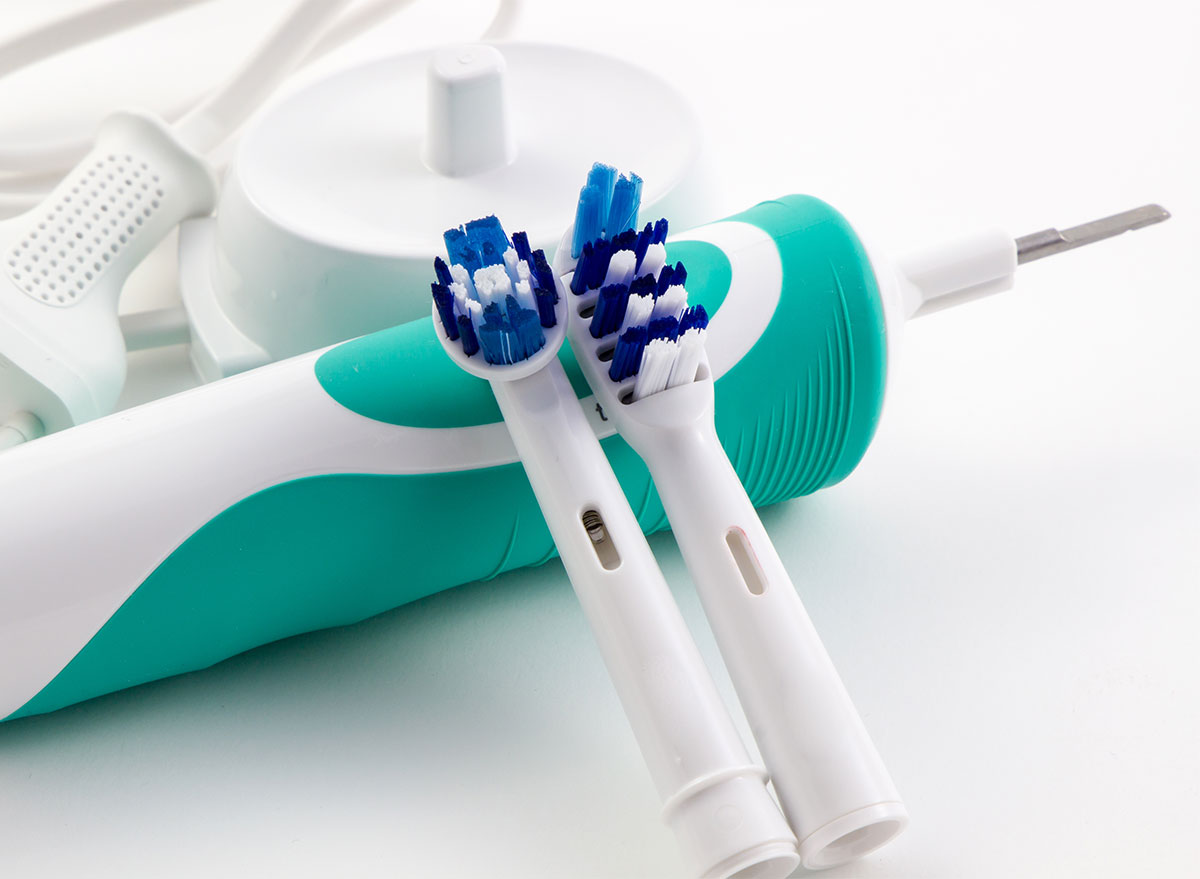
If you’re not using a timer while you brush manually, you have other options. “There is value in using an electric toothbrush because it’s on a timer. Most devices vibrate every 30 seconds to tell you to move on to a different part of the mouth so you cover all of your bases. Because of the way that they move and vibrate, they can help you do a better job in the hard to reach places, like the back of the mouth,” says Hewlett.
Floss once daily

While an electric toothbrush will seriously step up your oral health game, it’s not an end-all-be-all solution. “Flossing is just as important as brushing, and you should do it once per day. Flossing helps remove the plaque buildup between the teeth where the toothbrush can’t reach. Missing those areas can put you at risk for gum disease and cavities,” says Hewlett.
Don’t be deterred by bleeding gums, either. According to Hewlett, bleeding gums are a sign you need to floss more. Once you make it a habit, the bleeding will subside—even in a matter of days.
Don’t avoid the dentist

No one likes going, but taking a trip to your dentist yearly will give you the power of prevention. “At the very least, you should visit the dentist once per year, and we also recommend that people go in to get their teeth cleaned twice per year. That annual visit to your dentist is very important because you need to have that professional person who cares about your oral health to make sure you’re doing it right and to catch things early if something isn’t going right,” says Hewlett.
Understand the implications of oral health

We all want to keep our pearly whites bright and shiny, but taking care of your teeth has implications way beyond the cosmetic. “In the last several years, we’ve learned a lot about associations between your oral health and your general health. The issues that come up most frequently are heart disease, diabetes, and stroke. What the research is telling us is that if you have poor oral health—unhealthy gums in particular—the chances of having one or more of these diseases is increased. As far as one causing the other or not, that’s unclear. The fact is that there is an association, so ignoring your oral health could make you less healthy overall,” says Hewlett.
Avoid constant grazing

It’s not just what you eat, but how you eat it. For example, if you’re popping one Jolly Rancher in your mouth every hour, you’re still doing some serious damage because the sugar is lingering in your mouth for a long period of time. “If you’re constantly snacking on sweets—even if it’s a small amount—the acid level in the mouth stays up. The saliva doesn’t have a chance to clear it out and bring it back to normal. We see a lot of damage with this,” says Hewlett.
Apply sunscreen every single day

Our skin is our largest organ, so taking care of it properly can help prevent serious health issues (plus age spots and wrinkles) in the long term. “Ninety percent of the signs of aging and 90% of skin cancers come from unprotected daily exposure to ultraviolet light. It’s raining, it’s snowing, I’m in the car, I have darker skin—for all these reasons, people may not think they need to wear sunscreen, but it’s a big misconception. Wearing sunscreen every day is essential. It should be SPF 30 or higher. There’s a big selection of what people can wear, so find whatever works for you,” says Dr. Mona Gohara, Associate Clinical Professor in the Department of Dermatology at Yale School of Medicine.
Don’t use soap

Don’t stop bathing just yet. There’s a difference between healthy cleansing and harmful cleansing when it comes to picking the right products. “The biggest problem I see with washing your face is that people use the wrong thing to cleanse—like soaps, which are not good for your skin. They strip the epidermal barrier of its natural proteins and lipids. By soap, I don’t mean a bar, I mean a product with a pH of 13 or higher. The skin has a natural pH of 5.5, so you want a product that’s within that range, like the Dove Beauty Bar, which is the quintessential bar that you can use on your face that’s not a soap. If you’re only going to wash your face once, I would suggest doing it at night. If you can do it twice per day, that’s better,” says Gohara.
Exfoliate once a week

We spend enough time researching and picking out the right products, but unless we prepare our skin to soak up those topical items, we’re not going to see the results. “Exfoliation is essential. We lose about 50 million skin cells per day. Some of them naturally fall off, and some of them hang around. When they hang around, that’s prohibiting beneficial stuff from penetrating the skin. You don’t need something with microbeads or a gritty texture. Applying pressure with a washcloth is enough to slough off those dead skin cells,” says Gohara.
Always test cosmetic products before using them

Promises of a youthful glow—all packaged in a pretty bottle with an organic stamp of approval—can be particularly intriguing, but it’s best if you do your due diligence before lathering up your face in the latest product. “Just because something is organic and natural doesn’t mean it’s good for your skin. Poison ivy is organic and natural, and it’s not good for your skin. When trying a new product, I recommend that my patients apply it on their inner arm as a test for a week to see if their skin becomes inflamed,” says Gohara.
Get screened for skin cancer
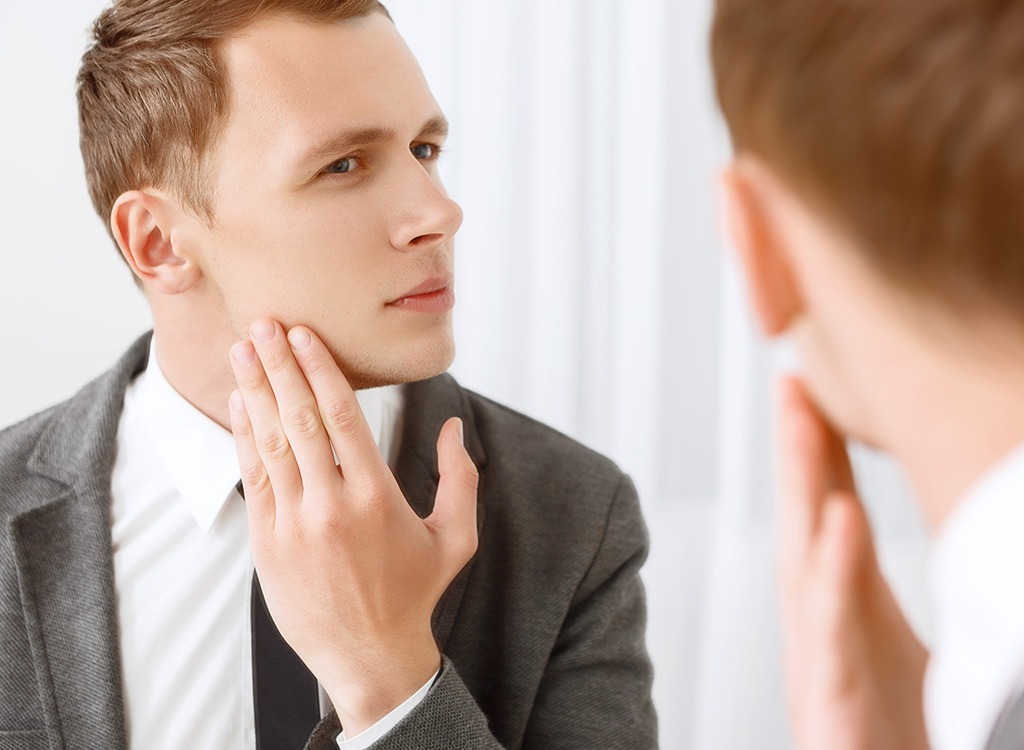
You may have coveted a tan in your teens and twenties, but the sunspots and skin cancer scares that follow down the road should not be taken lightly. “The American Academy of Dermatology recommends yearly skin cancer screenings starting at age 40, assuming you haven’t had any skin cancer before or a family history of melanoma. You should also be doing monthly skin examinations on yourself and schedule a yearly skin examination with a board-certified dermatologist. Melanoma is now the number-two skin cancer in young women, so it’s not unheard of for these things to be developing early. If you’ve been in a tanning booth just once, it would be wise to get a skin cancer screening,” says Gohara.
Remember to stand up

Regardless of your workload, taking small breaks throughout the day is non-negotiable when it comes to taking care of your ticker. “One of the biggest mistakes people can make when it comes to heart health is that they ignore their hearts. Everyone is so busy that they sit at their desks all day and work. They have to remember to get up and walk around. Bad habits such as smoking and sitting too often can increase your risk for heart attack,” says Dr. Goldberg.
Breathe deeply

“When you take full, deep breaths and adopt this as the way you breathe all the time, you can keep the stress response at bay. Breathing deeply and completely creates a greater sense of serenity and inner peace by accessing the part of the nervous system that allows us to rest and digest,” says Thacker.
Ask your doctor about your heart

At its core, eating healthy and exercising can help keep your heart healthy, but it’s best to consult an expert on other matters of the body. “Schedule a checkup with your primary care physician to learn about your personal risk factors. You will learn about your blood pressure and have labs drawn to check your cholesterol and glucose levels. Go to the appointment with information about your family’s history of heart disease [so that your doctor can provide you with the best and most accurate advice possible to keep your heart healthy],” says Dr. Goldberg.
Break up with alcohol

Too many happy hours make for a not-so-happy time down the road. First, there’s the issue that imbibing is often replacing your time at the gym. Plus, over time, excessive alcohol consumption can increase your risk for high blood pressure, heart disease, certain cancers, and dementia. White recommends sticking to one serving for women and two servings for men of alcohol per day at most to avoid weight gain and the negative health effects of overconsumption.
Give your metabolism a hand

In our youth, our bodies seem to work efficiently with little to no help at all. However, as we get older, you need to give your metabolism a hand in order to maintain a healthy weight. “Our metabolism drops one to two percent per decade after age 25, which can lead to unhealthy and unwanted weight gain. There are physiological reasons why we’re gaining weight, but also a lot of psychological reasons and socioeconomic factors. Regular exercise increases our metabolism and also eating six small meals throughout the day can help,” says White.
Avoid sleep disruptors

Turn off the TV, put down your phone, and shut your body down. When it comes to being physically fit and healthy, sleep is at the top of the list of necessities. Poor eating can affect sleep, and not exercising can also hinder sleep. Good sleep is also critical for reaching your flat-belly goals, which would be nice because you’re going to live longer, right?
Make an effort to learn new things

“Continue to learn new things throughout your life. When you stimulate your brain and keep it active, it continues to work for you. It also increases a sense of having a purpose,” says Thacker.
Utilize common, natural products in daily health routines

“Daily consumption of various common spices (nothing exotic) pose extensive scientific literature supporting human pharmacologic effects. [Try using] cinnamon (for sugar control), turmeric (for inflammation), celery seed (for blood pressure), cardamom (for anti-fibrotic effects), and cloves (for cross-link prevention),” says Ira S. Pastor, CEO of the regenerative medicine company Bioquark Inc.
Try lavender oil
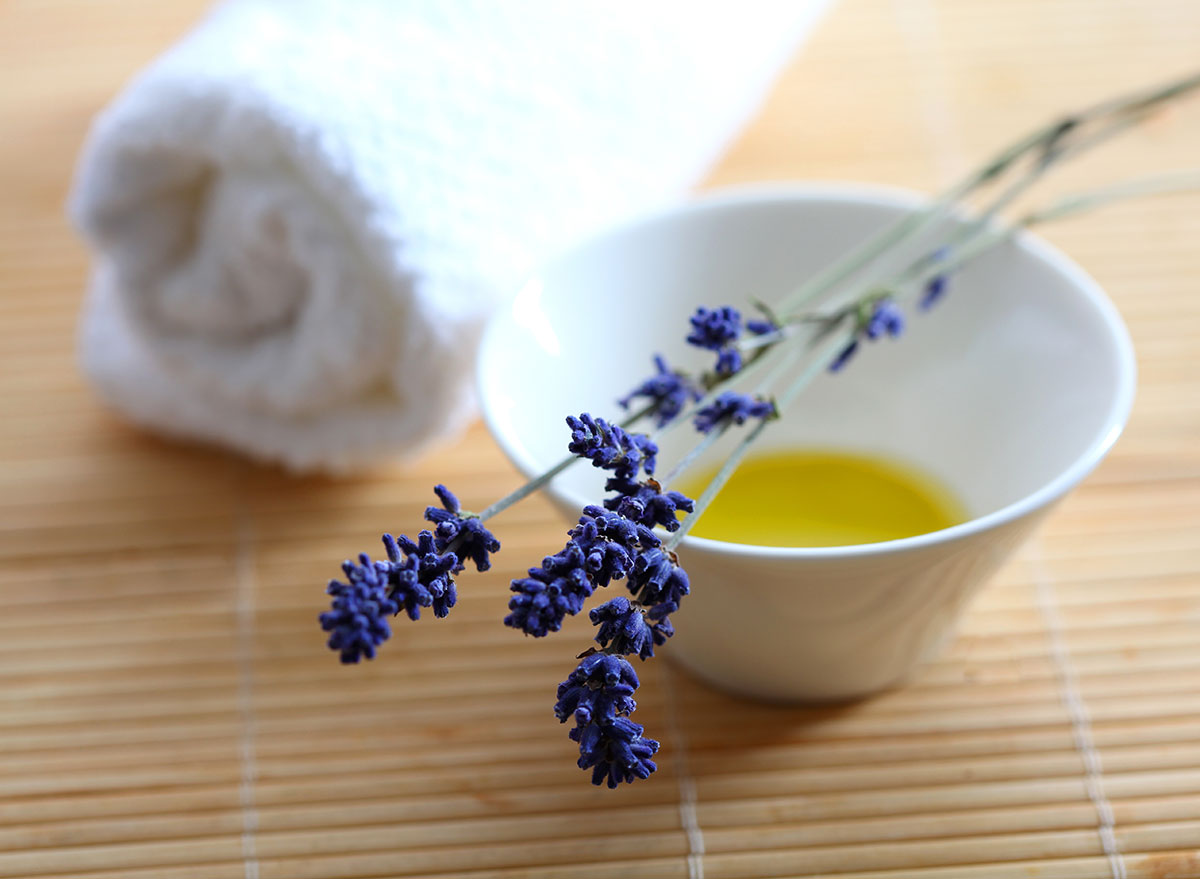
“For deep sleep and more energy in the morning, put a few drops of lavender essential oil on your temples. It is the best essential oil for relaxation,” says Perepyolkina.
Work out with weights

“Weight-bearing exercise can help slow bone loss. Putting weight on your bones by walking, running, and/or lifting weights stimulates the growth of new bone. Exercise can also help keep joint cartilage healthy. Strong muscles support joints and reduce the load on them. A 2012 [meta-analysis] found that [physical activity] increased the life expectancy of both men and women by [about] 3.7 years each.” says Carolyn Dean, MD, ND, author of The Magnesium Miracle and 365 Ways to Boost Your Brain Power: Tips, Exercise, Advice.
Do cardio

“A 2016 study found the top three types of exercise for longevity were racquet sports (like tennis and racquetball), swimming, and aerobics. Overall, 44% of the people met recommended public health exercise levels. (That’s 150 minutes of moderate-to-vigorous activity each week in the U.S.) Among the people who did 150 minutes of moderate-to-vigorous activity each week, people who played racquet sports had a 47% lower risk of dying during the nine-year study than people who didn’t exercise. Swimmers had a 28% lower risk of death, and those doing aerobics showed a 27% lower risk of dying. These were the reductions after the scientists adjusted for factors that might affect early death, like smoking,” says Dean.
Take a magnesium supplement
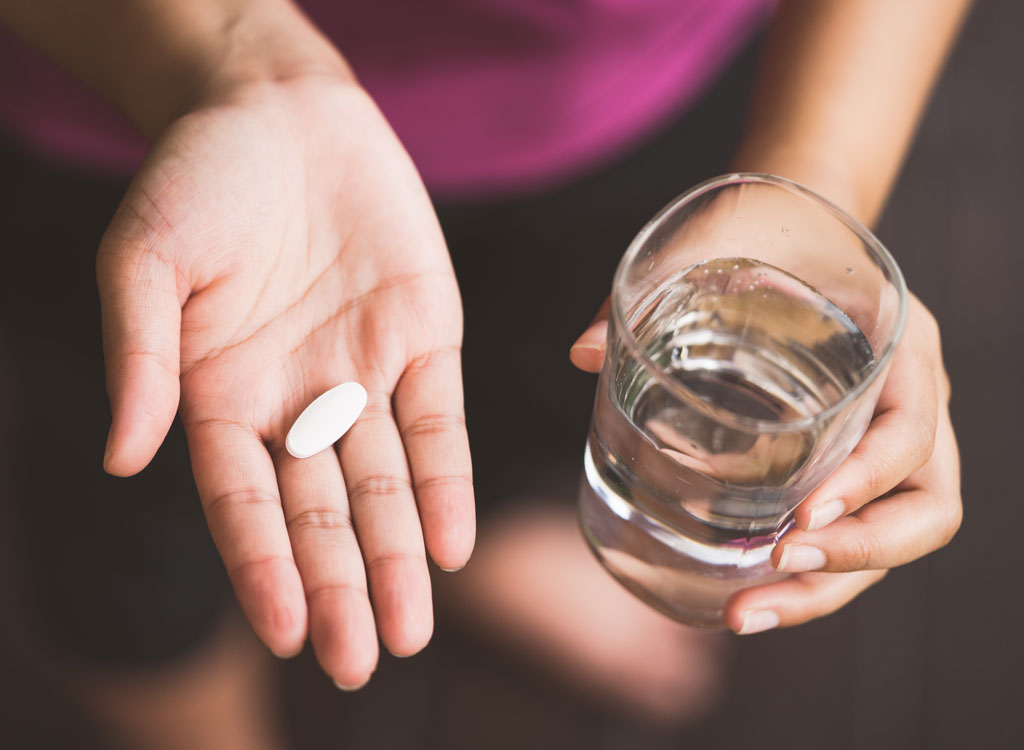
“The mineral magnesium is a vital energy nutrient which I use and recommend to my patients to keep their energy up and their mental focus throughout the day. Of the 700-800 magnesium-dependent enzymes, the most important enzyme reaction involves the creation of energy by activating adenosine triphosphate (ATP), the fundamental energy storage molecule of the body, which needs magnesium to properly function and will help improve your energy levels. Magnesium is also a muscle and nerve function mineral. Magnesium is vital for proper muscle function and nerve firing and for both exercise and recovery from exercise,” says Dean.
Create a sugar budget
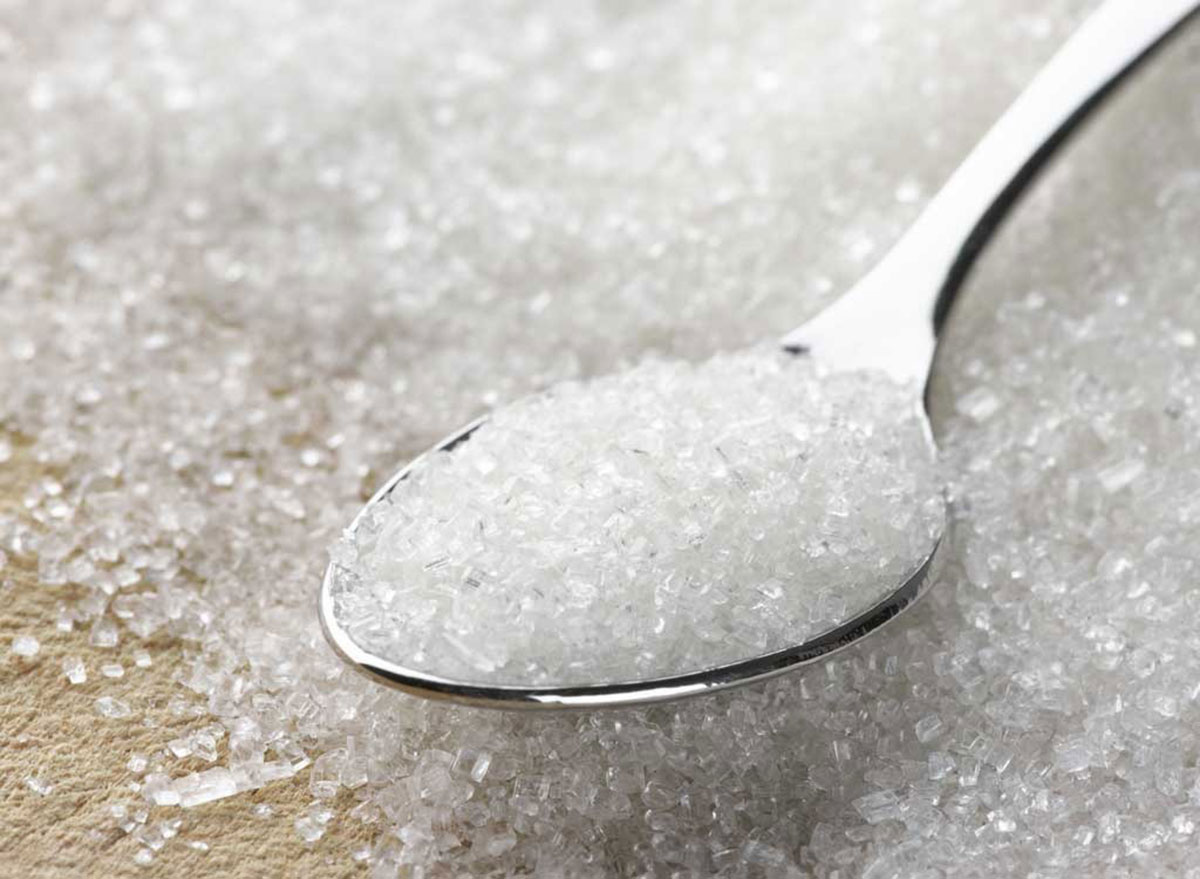
“It’s almost impossible to consume zero sugar at all, [which is why I recommend trying a] sugar budget where you aim for no more than 50 grams of sugar per day (and that includes ALL sugar, not just added sugar). Consuming 50 grams per day [is about] 10% of your 2,000 calorie diet (sugar is 4 calories per gram, 200 calories from sugar). Just like with any budget, it’s something you strive to maintain, but sometimes you’re going to go over and sometimes you’re going to be under—as long as you’re balancing where you can,” says Paddy Spence, 30+ year health industry veteran and CEO of Zevia.
Manage your mornings

“Earlier, calmer mornings minimize stress, and stress spurs the adrenal glands to release stress-level-spiking cortisol. Research also shows stressed people are more prone to health risks,” says Spence.
Eat a high-protein breakfast
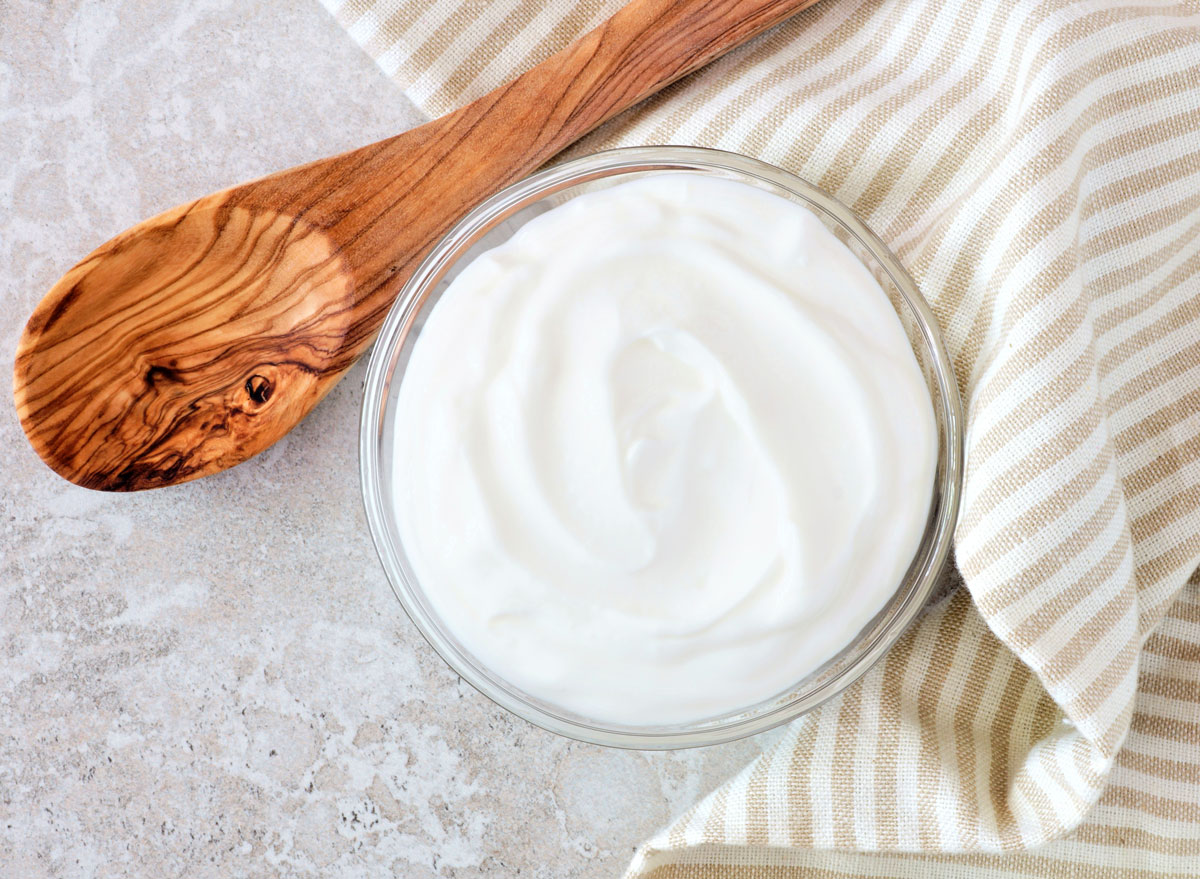
“Eating more protein at breakfast can reduce glucose spikes in the a.m., and those benefits can extend to lunch. Bonus: It also prevents high-sugar snacking in the evening. Swap overly processed cereal for grain-free granola, which is often low in carbohydrates (that become sugar in the body). It also tends to have fiber-rich seeds and nuts, spices, and minimal sugar from unrefined sources such as whole fruits,” says Spence.
Nosh healthfully

“Choose a lunch high in brain-boosting omega-3 fatty acids, which can reverse the effects of fructose. And when you’re hungry between meals, junk foods are twice as distracting than healthy foods. Proactively curb sugar cravings by keeping energy stores full with a healthy midday snack. If sweets call, try Greek yogurt with fresh or dried fruit. It’s rich in protein, fiber, vitamins, and antioxidants, which balance its natural sugar content,” says Spence.
Take a post-dinner stroll

“Choosing healthy meals is important, but what you do after dinner might impact blood sugar more significantly. A 15-minute post-dinner walk can help regulate blood sugar for up to three hours,” says Spence.
Ban electronics from your bedroom

“By keeping electronics out of my bedrooms, I am getting more hours of sleep per night since I am not staying awake, watching Netflix, or scrolling mindlessly. My sleep quality is also better; I wake up feeling much more rested. I wake up feeling ready to take on the day instead of exhausted and wanting to stay in bed. The blue light from tablets and smartphones interferes with healthy sleep because it suppresses melatonin, an essential hormone for sleep. I use blackout blinds in my bedroom to keep unnatural lights out of my bedroom. I go to bed earlier and make sure I get at least eight hours of sleep a night, sometimes more. The difference has been amazing: Sleeping well will pay you remarkable dividends, yet it is a passive, inexpensive activity,” says Leslie Fischer, Founder of Sustainable Slumber.
Get more sleep

“Most of us are chronically sleep-deprived, which can lead to increased rates of depression, obesity, and high blood pressure. Getting even one night of fewer than six hours of sleep can increase our hunger hormones and decrease our satiety hormones. Sleep is when our body can recharge and get ready for the next day—our body needs that time. The old fallacy that sleep isn’t necessary has been proved wrong time and time again. Figure out when you want to go to sleep and work backward. Three hours before your desired asleep time, stop eating. Ninety minutes before, turn off all devices. Both practices will help you sleep better and let your body know it is time to relax,” says Erin Wathen, Certified Life and Weight Loss Coach, and Food Addiction Counselor.
Develop a stress management practice

“How do you manage stress? By smoking cigarettes, eating a bag of Cheetos, or yelling at the dog? None of these habits are very healthy or productive. We need to develop healthy coping mechanisms such as yoga, meditation, or journaling to get us through whatever life might throw at us. Many people find great success through their spiritual practices in such unusual places like surfing or running. Be open to whoever comes your way,” says Wathen.
Quit smoking

“Joining a smoking cessation program is a great gift to give to yourself. Smoking is a well-known risk factor for multiple chronic diseases. Cutting back or quitting smoking is an excellent way to live a healthier life,” says Summer Yule, MS, RDN.
Remove clutter

“This means [getting rid of] the old acid wash jeans that you will never wear again, as well as the menus from the Chinese food place that went out of business three years ago. The friendships that are no longer working for you and the destructive habits that you know are not serving you. They all need to go. We often dread cleaning the house as it seems way worse than it actually is once we get to it. Digging deep and doing the work and having the spaciousness in ourselves and our homes lets in the creativity and possibility that we didn’t see when we were surrounded by the clutter,” says Wathen.
Eat more healthy fats
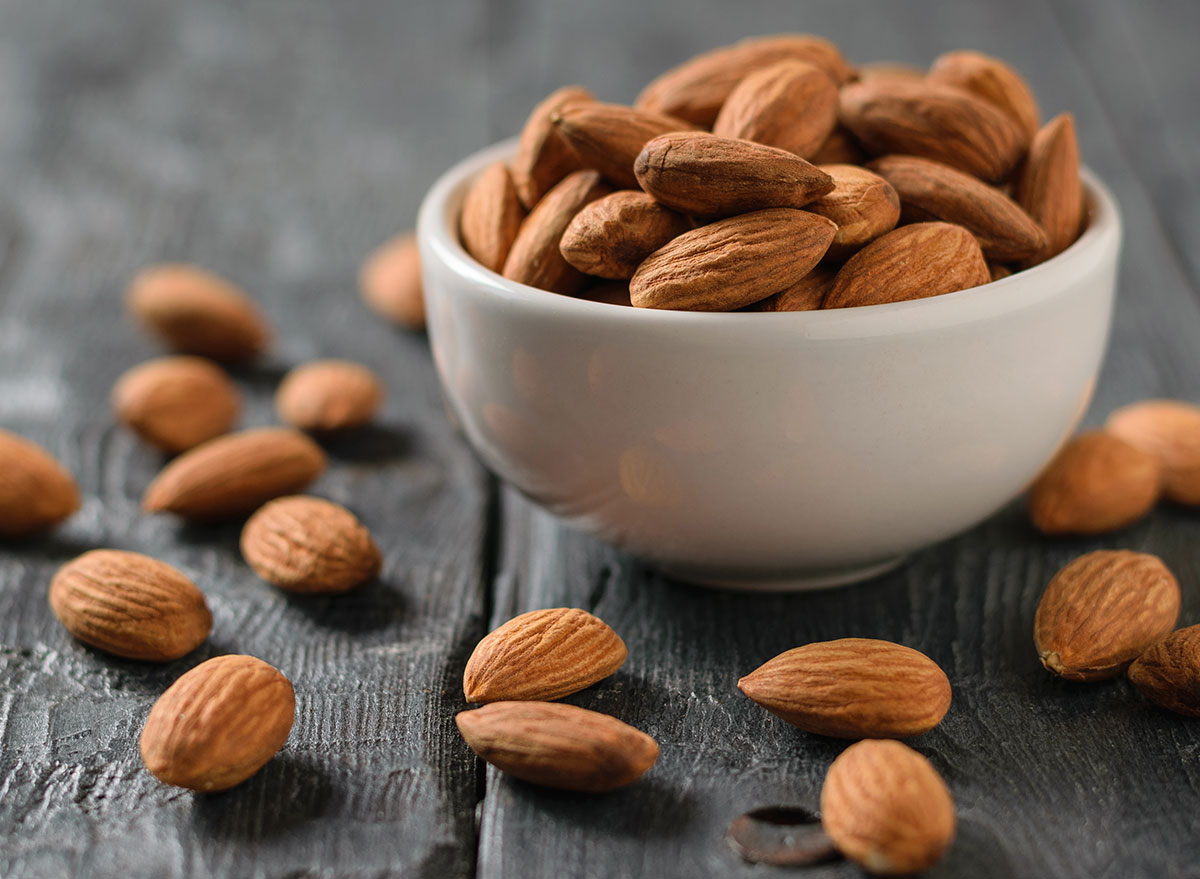
“Including a source of healthy fat in every meal will leave you satiated and prevent cravings. Think whole milk in your coffee, eggs for breakfast, avocado on your salad at lunch, almonds or other nuts as an afternoon snack, and cheese on your tuna melt at dinner. Fat doesn’t make us fat—sugar makes us fat—so enjoy healthy fats throughout the day,” says Perry.
Practice gratitude

“We all have things to be grateful for, and studies show that writing down one to three things every morning that you’re grateful for can improve your mood, reduce stress, and increase overall happiness. We can get so caught up in negative thought patterns, jealousy of others, and dissatisfaction with our lives that we often forget all the things we have to be grateful for: think of a supportive friend, a loving family member, or something you were proud of at work,” says Perry.
Shop the perimeter of the grocery store

“Supermarkets are almost all set up similarly: the refrigerated aisles are on the perimeter, and the dry goods are in the middle aisles. By shopping outer edges of the grocery store, you’ll stick to aisles containing fresh fruits, vegetables, eggs, and dairy, but NOT the junk food aisles. For those inside aisles, try to make a list of exactly what you need, and purchase only those items. This step alone will stop you from impulse shopping for ice cream when you meant to buy frozen broccoli or sugary cereal when you meant to buy oatmeal,” says Kelsey Peoples, MS, RDN.
Always pack snacks
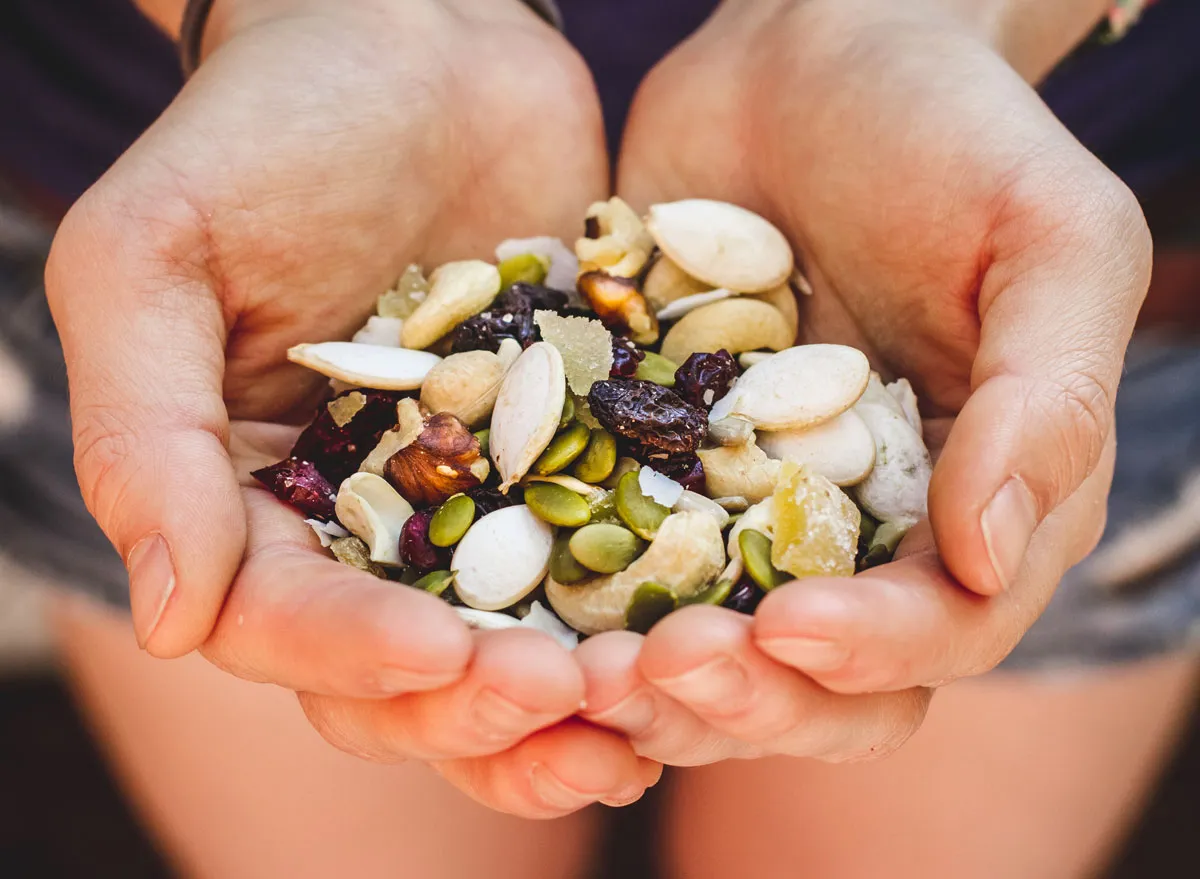
“Say ‘no’ to vending machines and drive-thru windows by planning ahead and carrying healthy snacks with you. Those moments where you are out of time and need to get something in a pinch are when you will make your least healthy choices, like mid-afternoon vending machine cinnamon rolls or a medium order of fries and a soda for the road. Instead, choose a snack bar that is high in protein (at least 7 grams) but relatively low in sugars (less than five grams) and keep a box in your desk, car, purse, or briefcase,” says Peoples.
Eat mindfully

“A busy lifestyle doesn’t have to be the enemy of health, but it tends to be a big barrier. One of the worst side effects of a non-stop day is that we no longer take time to mindfully eat. If you eat breakfast in the car, lunch at your desk, or dinner in front of the TV, then you’re mindlessly eating, which leads to higher caloric intake and less satisfaction from your food. Instead, give yourself permission to eat more intentionally. Take at least 20 minutes per meal and focus on the foods you choose, the pace of your eating, the flavors you’re enjoying, and your hunger cues that will let you know when you’re full so you stop eating before you automatically clean the plate and reach for seconds,” says Peoples.
Stop trying fad diets

“Trendy diets that tell you to cut out huge categories of food, replace meals with detox drinks, or buy specific supplements are more than likely not worth the time or effort. Why is that? Because there is no quick fix to health! Try to eat as many whole foods as possible, minimize saturated fats and trans fats by choosing lean meat and dairy and avoiding processed foods, choose whole grains over refined grains, and get your daily fruits and vegetables (the goal is about two cups of each per a 2,000 calorie diet). I find that following the 80-20 rule is a fantastic goal: make 80% of your choices health-focused, and allow 20% of your food choices to be pleasure-focused. This will help you eat overall healthier items and improve your energy and health while still allowing room for life’s pleasures, like birthday cake or Sunday brunches. The 80-20 rule is maintainable, which will help you build habits you can maintain for a long, healthy life,” says Peoples.
Do what you love

“Doing what you love doesn’t need to be your full-time career, but when you something you truly enjoy, it can transform your mood, your relationships, and your health—giving you something to look forward to even when life gets you down. Maybe you already have an idea of what you enjoy doing, and if so, now’s the time to dive in and enjoy more of it. Otherwise, try exploring local clubs and sites like Meetup.com to see what groups and activities are available in your area. You’ll find plenty of ideas, plus a sense of community to go along with them,” says Jacquelyn Salvador, author and founder of 360 Living.
Do good deeds

“Doing altruistic acts helps more than just the recipient; studies show that the giver also gains a great sense of meaning and happiness. It can even inspire and encourage people around you, giving everyone a much-needed boost in the goodness of humanity. That happiness is something you’ll carry around with you well after the act itself, putting a spring in yourself and creating a virtuous cycle of action. Maybe it starts with something simple like, buying a hot coffee for someone on the street, or you could check out altruistic sites like Kiva, which allows you to help people change their lives for the better via microlending. Each of us has our own capacity to help others—why not make the world a bit brighter,” says Salvador.
Make meaningful connections

“Make an effort to connect with people more (and more meaningfully). In our hyper-connected world, we have the impression of being connected all the time, but this actually masks the fact that many of us lack deep, meaningful connection. Instead of doling out copious likes for everything that flashes on our screens, we’ll find a lot more fulfillment, happiness, and meaning by making an intentional effort to reach out to friends and even to interact more meaningfully with people we don’t necessarily know. It could be writing a letter, picking up the phone, scheduling a coffee date, or just striking up a conversation while waiting in line at the bank—they seem minor, but they can make all the difference in our mental health and happiness,” says Salvador.
Know your day’s intention

“More and more the demands of life are increasing, and multitasking is the norm. Some people may find themselves jumping out of bed and starting the day without missing a beat. Starting the day with a centering activity such as naming your intention for the day can help set the tone,” says Maya Feller, MS, RD, CDN.
Eat until you’re almost full

“Studies have shown that limiting calories can lower the production of T3, a thyroid hormone that slows down metabolism and speeds up aging. Also, be sure to eat balanced meals throughout the day, including lean proteins, non-starchy vegetables, and monounsaturated or polyunsaturated fats (such as avocados, whole eggs, and salmon),” says Melanie Kotcher, HIIT & Pilates Instructor and Wellness Coach.
Get enough Vitamin D

“Getting exposure to vitamin D from the sun has many health benefits, including absorbing calcium and promoting bone growth. Too much vitamin D, however, can increase the risk of skin cancer (if not protected). It’s important to speak with your doctor about how to get the right amount of vitamin D in your system,” says Kotcher.
Still, getting into the sun—with proper sun safety measures—can do wonders for your mental health.
“Several times during the day, try taking a short break and going out into the sunlight. Take off your shoes and stand on the ground. Being out in the sun has been known for thousands of years to make us feel energized. Being barefoot on the ground will connect you with the energy of the earth,” says Perepyolkina.
Cook at home more often

“Restaurants often use a lot of sugar in their meals to make them taste better. If you eat in more, you can control the amount of sugar in your food. You can make healthy tasty meals at home without all the extra sugar. Cutting dietary sugar may help you live a healthier, happier, and longer life,” says Dr. Alex Tauberg DC, CSCS, CCSP, EMR.
Eat more fiber
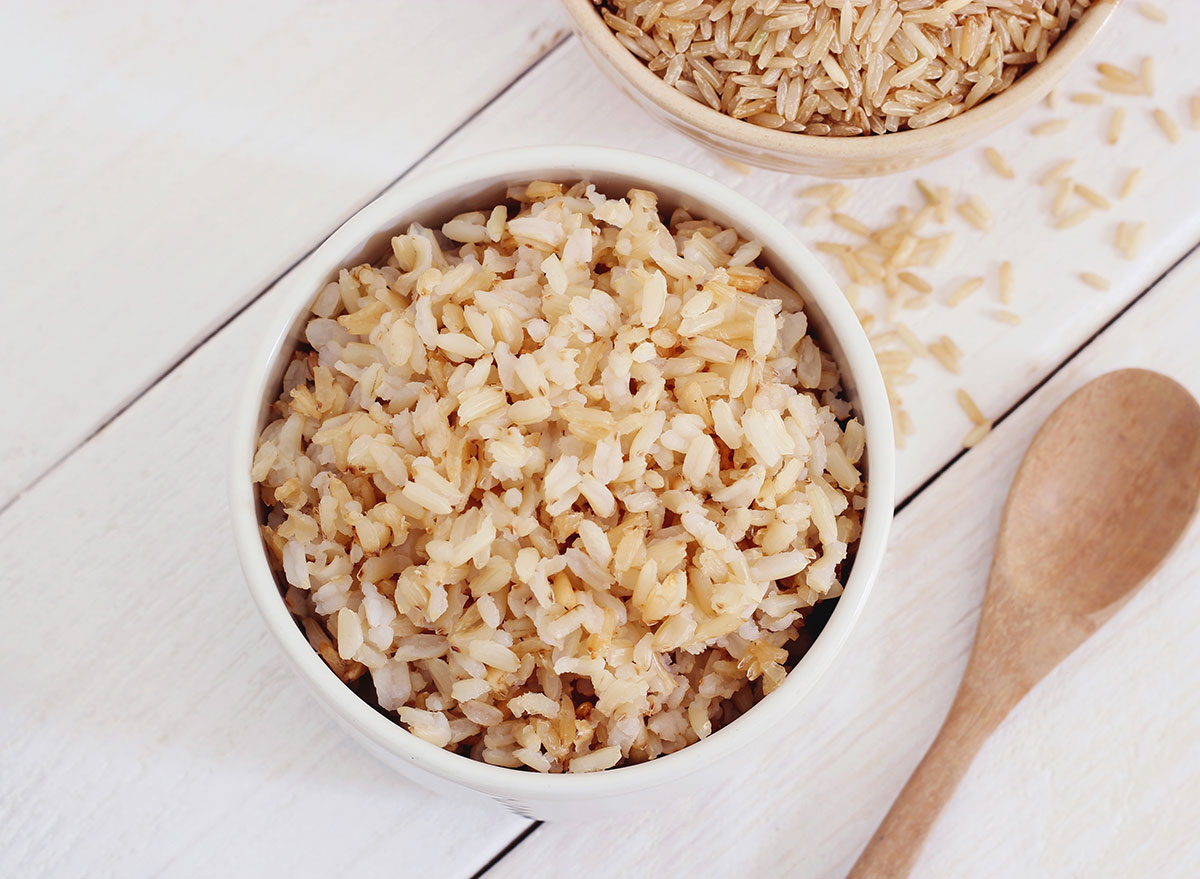
“Our bodies were designed to eat foods with fiber, like whole grains, beans, fruits, and vegetables, but through food processing methods, many of our foods have become overly refined. Choosing foods like whole-wheat bread over white bread, brown rice over white rice, fresh fruits and vegetables with peels rather than pressed juices or canned fruit, and any type of bean will help increase your fiber to keep you full longer, while also promoting gut health—research has strongly linked fiber intake to a lower risk of colon cancer,” says Peoples.
For more healthy eating tips, be sure to sign up for our newsletter.